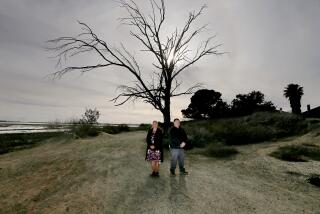A new face at the Republican helm
Republican officials voted Friday to elect their first black national party chairman, a response in part to election defeats that have left the party’s base more white and Southern at a time when the country is growing more diverse.
The election of Michael Steele puts in the limelight a charismatic African American who has championed outreach to minorities as key to the party’s future. It also gives the GOP a symbolic counterbalance to President Obama, the nation’s first black president, as it courts minority voters and attempts to overhaul its image.
“It’s time for something completely different,” Steele said after being chosen by members of the Republican National Committee. He promised to bring the party to “every corner, every boardroom, every neighborhood, every community.”
But Steele, a former lieutenant governor of Maryland, faces a difficult challenge in leading a party that remains divided over key issues, such as how to fix the economy and whether to grant citizenship to millions of undocumented workers, and that has been in disarray since losing control of Congress in the 2006 midterm elections.
And beyond the imagery of having an African American atop the Republican National Committee, it is not clear that Steele can make substantive gains among minorities at a time when Obama has captured the imagination of black Americans as well as more than two-thirds of the Latino vote.
Steele himself acknowledged some of the challenges ahead. He suggested that the GOP’s troubles lie more in how the party is perceived than in public disapproval of its policy stances.
“We have an image problem,” he said, adding later, “We’ve been mis-defined as a party that doesn’t care, a party that’s been insensitive, a party that’s unconcerned about minorities, a party that’s unconcerned about the lives and expectations and dreams of average Americans.”
Steele’s victory late Friday was greeted with thunderous applause in a downtown hotel ballroom here where Republicans, throughout a two-day meeting, had mulled over somber assessments of the GOP’s performance in recent elections.
But it was clear even from Friday’s voting process that, in addition to remaking the party’s image, the new chairman faces hurdles in asserting his power within Republican circles.
It took six contested ballots before Steele defeated a slate of candidates that included the party’s incumbent chairman, Mike Duncan. In the end, it was a divided Republican National Committee -- 91 out of 168 members -- that backed Steele over the last challenger standing, Katon Dawson, the white chairman of the South Carolina GOP, who had presented himself as the rock-ribbed conservative in the race.
Steele, relatively new to the national stage, will have to jockey for attention with other Republican leaders, as well as with talk show giant Rush Limbaugh, who in recent days has gained traction as a leading conservative challenger to Obama. Limbaugh, for example, took credit this week for pressuring House Republicans to vote in a solid block against the president’s $819-billion stimulus package.
Asked Friday about Limbaugh, the new Republican chairman suggested that he would try to forge a separate path.
“Rush will say what Rush has to say,” Steele said. “We will do what we have to do as a party to make sure that our message . . . [is] very clear and unambiguous.”
Steele also faces a struggle in rebuilding the GOP’s once-dominant grass-roots network. Under President Bush and Bush’s strategist, Karl Rove, the Republican Party built a get-out-the-vote operation in 2004 that was unmatched in its time. But last year, Obama built and mobilized a far more powerful machine, amassing 13 million e-mail addresses and thousands of trained organizers who are now being deployed to push the new president’s agenda.
Figuring out how to combat that network, and match its technological prowess, will be one of Steele’s most important tasks.
He had been criticized during his bid for the chairmanship as too moderate, with some raising questions about his ties to a Republican group that backed candidates who supported abortion rights. Steele ran for the U.S. Senate in 2006 as a staunch opponent of abortion.
During that unsuccessful campaign, Steele drew the attention of conservative talk radio when he appeared to distance himself from Bush amid public disapproval of the GOP record on Hurricane Katrina and the Iraq war, and when he described the Republican label as a “scarlet letter.”
One conservative member of the national committee, Steve Scheffler of Iowa, said he was ready to help introduce Steele to skeptics. “With a lot of the conservatives in Iowa, we’ll have to visit with people and make people feel comfortable with him,” said Scheffler, who had supported Dawson.
Sean Steel, an RNC member from California, said Steele would “be going to places Republicans haven’t been seen in a long time. And he’s able to communicate in all sorts of levels that we haven’t done before.”
--
More to Read
Get the L.A. Times Politics newsletter
Deeply reported insights into legislation, politics and policy from Sacramento, Washington and beyond. In your inbox three times per week.
You may occasionally receive promotional content from the Los Angeles Times.






